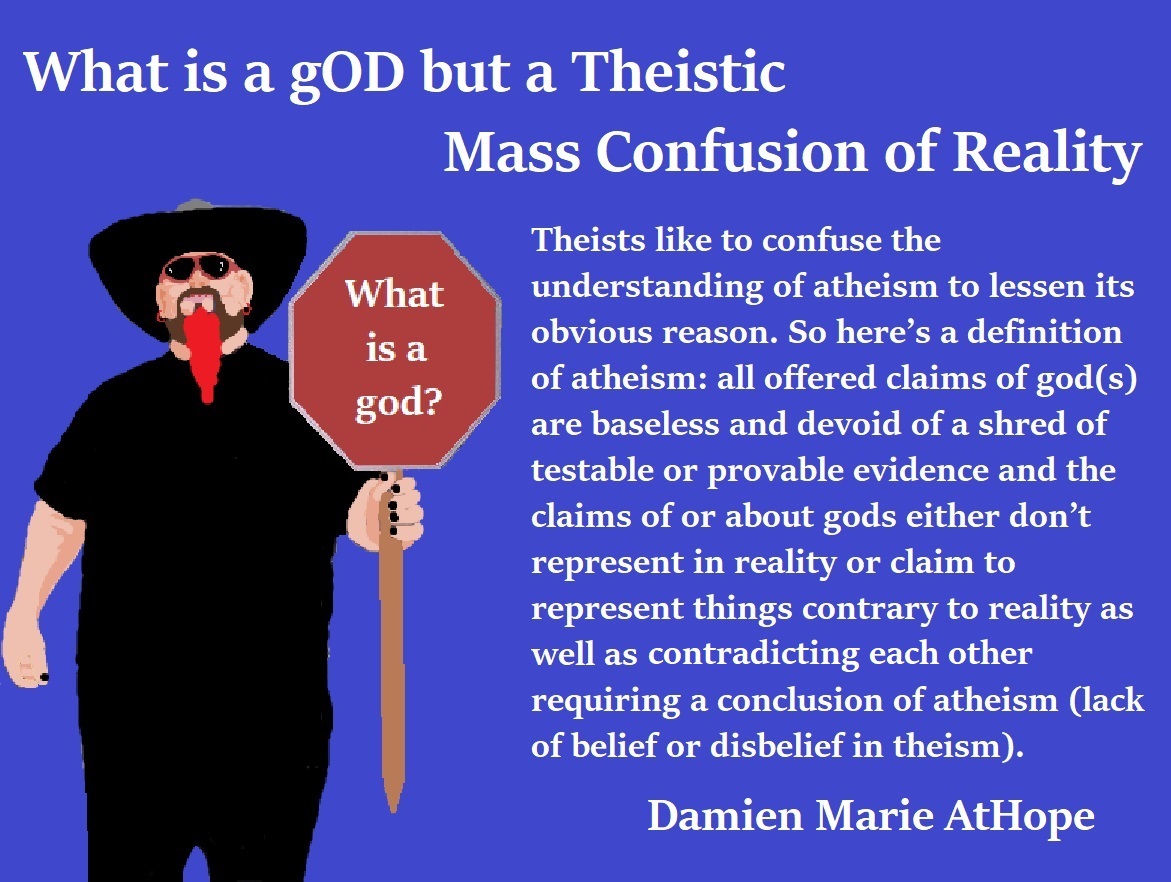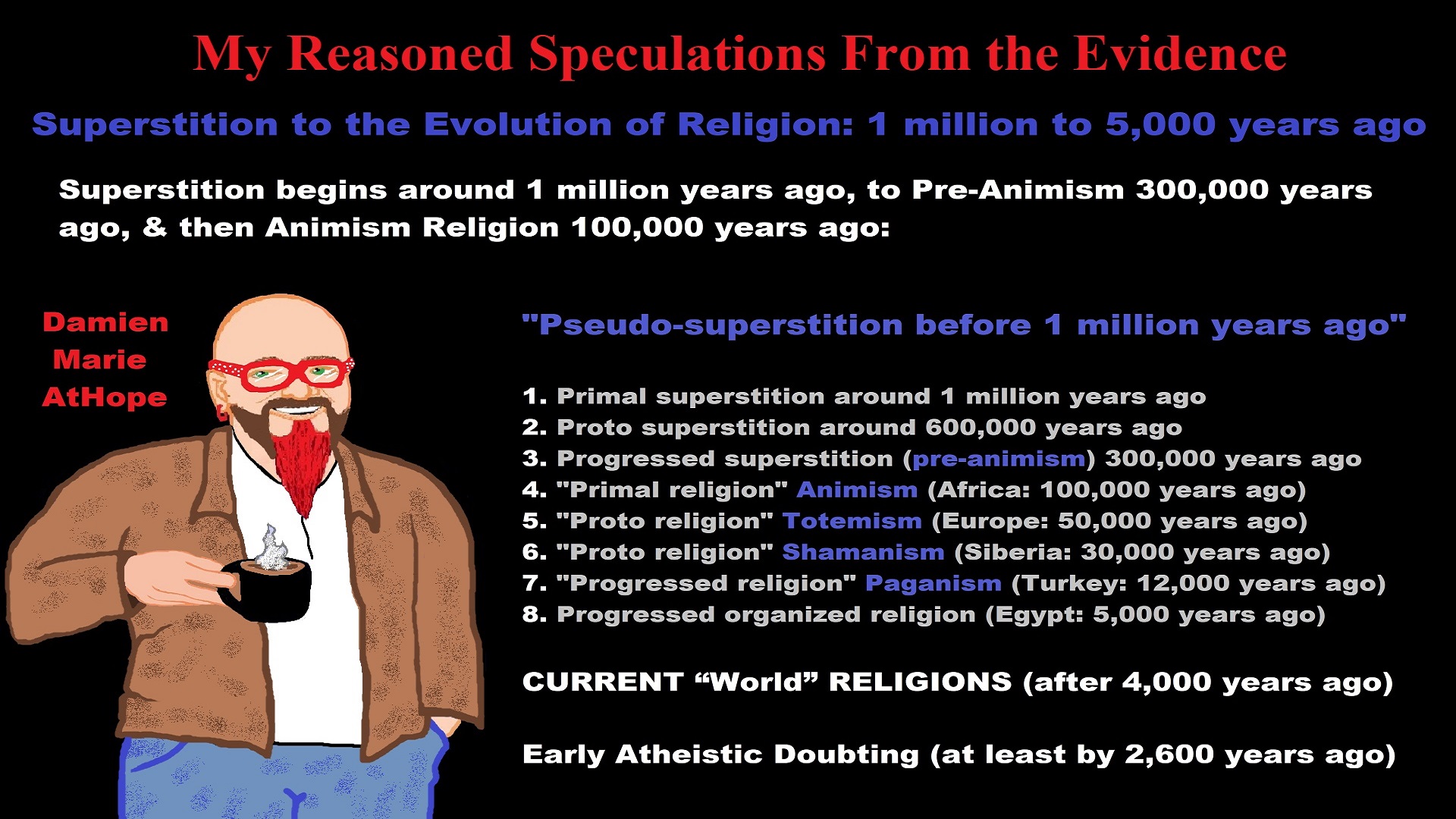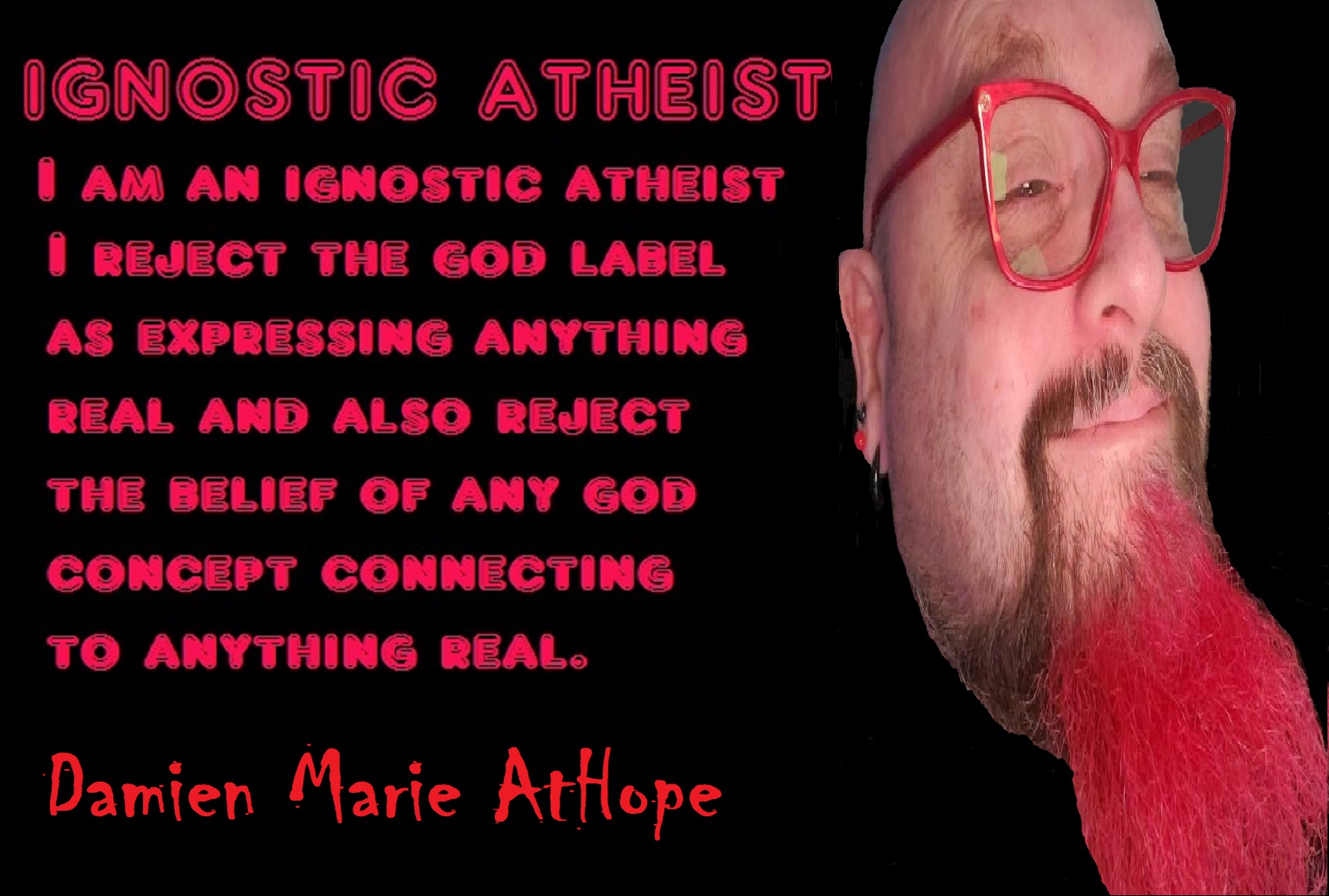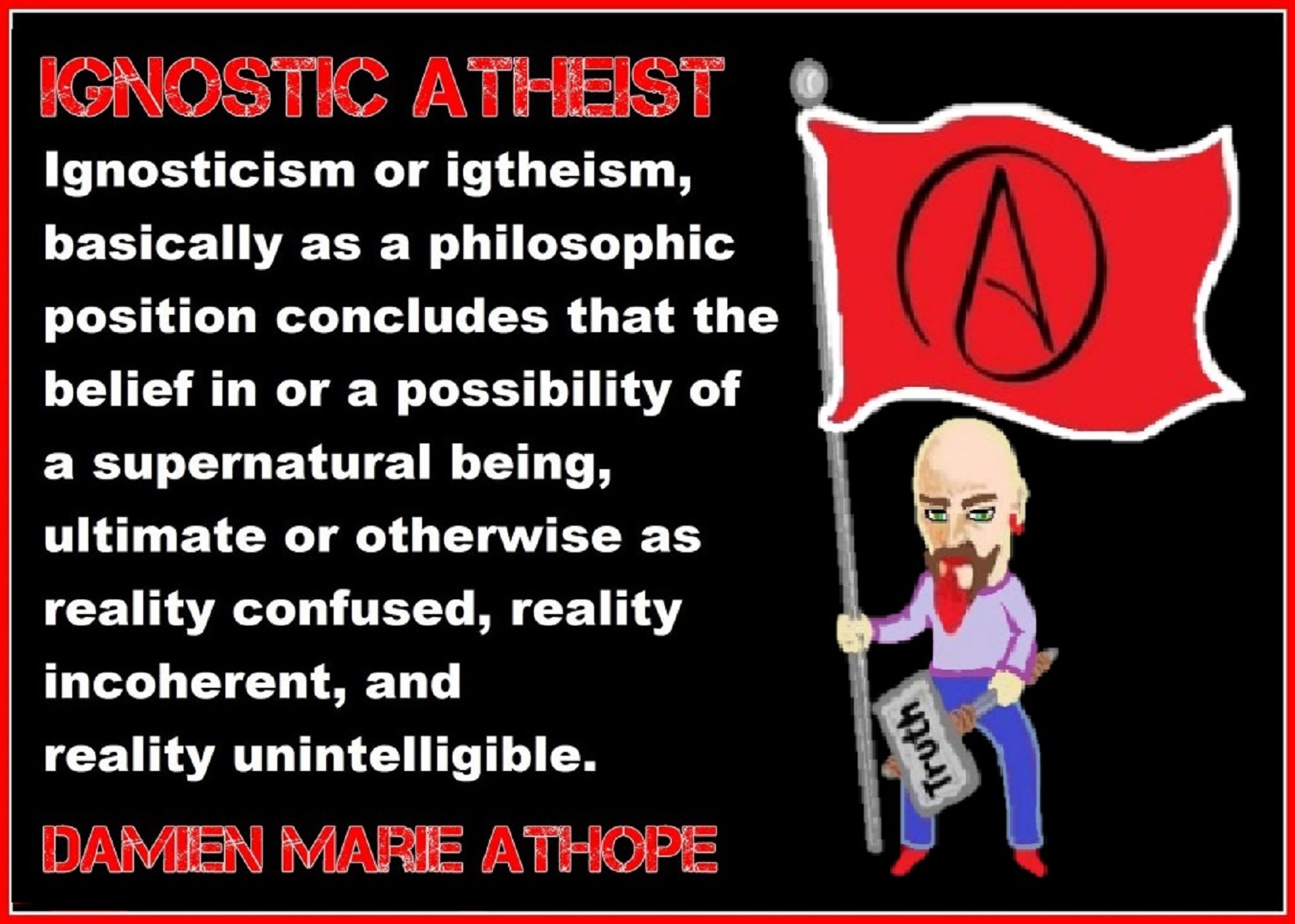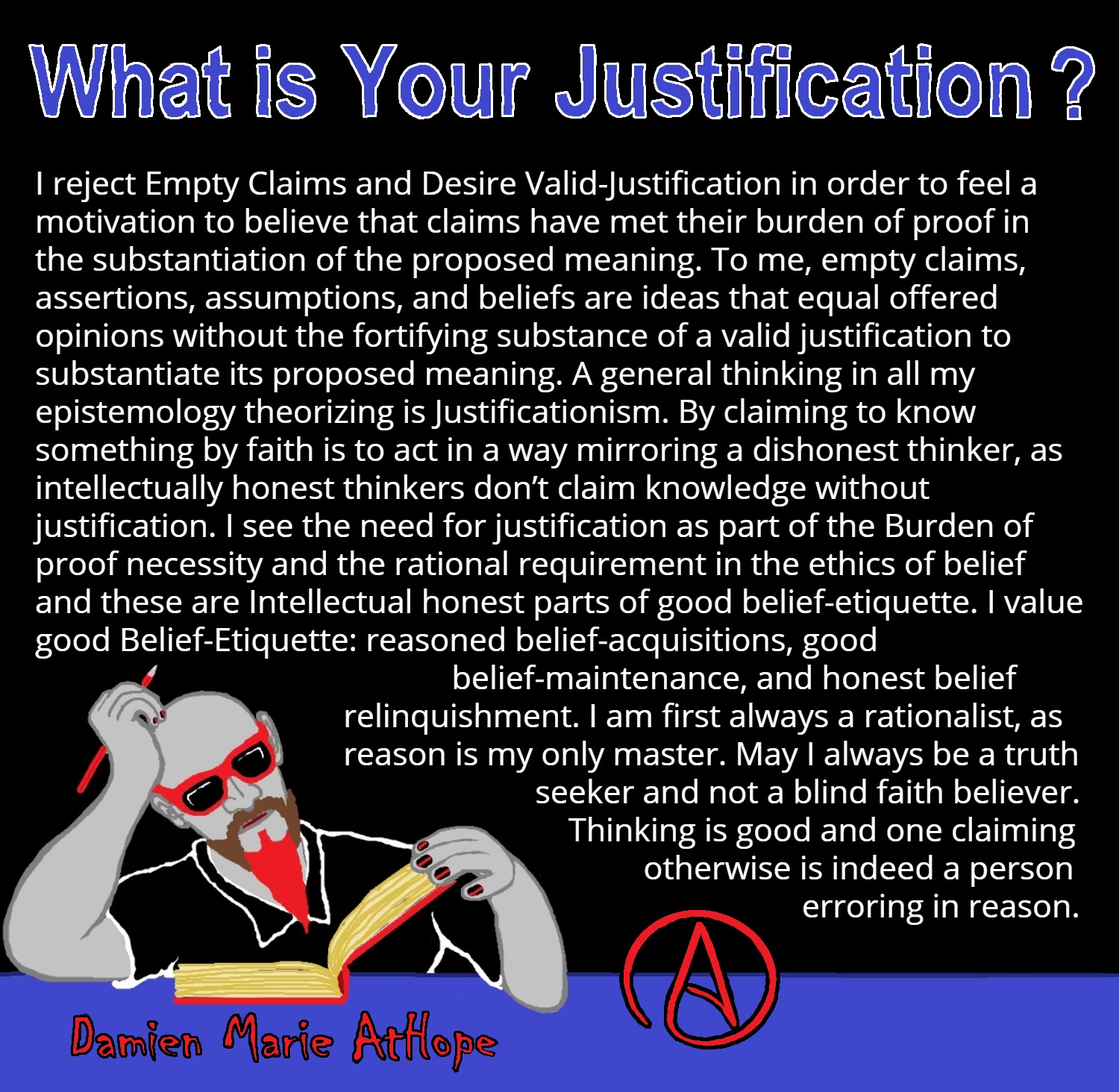
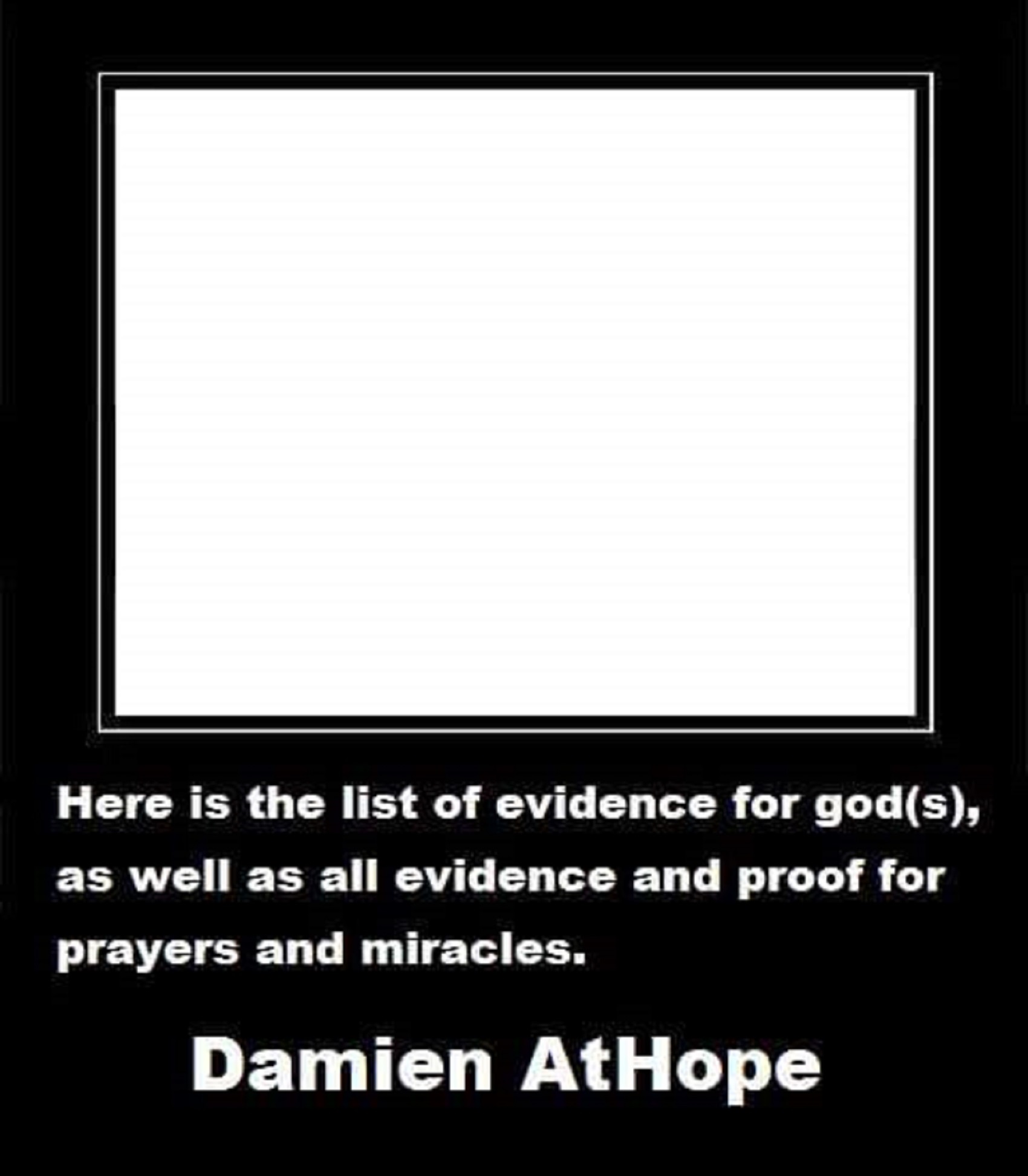
Allowing that magical thinking or the possibility of magical thinking being real is clearly not supported by any facts in reality. Thus, it is just more a social engineering “indoctrinated belief” connected to learned magical thinking supernaturalism and/or superstitionism. When asked whether they believe in the existence of one or more Gods and/or Goddesses, Theists will say yes; strong Atheists will say no. Agnostics will say I don’t know or often cannot give a straight “Yes” or “No” answer but are still either classified as either Weak Theism or Weak Atheism as it’s a belief question and no mater how one tries to add or subtract other things the main issue still is, “do you believe in theism” if the answer is anything but yes or some variant of maybe yes then it’s a no; thus one is an atheist as all it takes is a lack of believing theism but it can be disbelief even a beliefs there is no god. Agnostics might respond with one of the following (Weak Theism or Weak Atheism):
Weak Theism (Agnostic)
- Weak Theism: Yes, a god(s) and/or goddess(es) exists though I am not sure or don’t know about god(s) and/or goddess(es) at this time.
- Weak Theism: Yes, a god(s) and/or goddess(es) exists. However, we have no possibility or certainty of knowing anything about God, now or in the future.
- Weak Theism: I think that a god(s) and/or goddess(es) exists, but have no proof.
- Weak Theism: I think so, but cannot be positive that a god(s) and/or goddess(es) exists.
- Weak Theism: I don’t know but will lead my life assuming that a god(s) and/or goddess(es) does exist just to be careful, perhaps because of the rewards or to stop some punishments one would receive if a god(s) and/or goddess(es) does exist.
- Weak Theism: I worship a god (or a god and goddess, or a goddess, or some combination of god(s) and/or goddess(es) but cannot prove that they exist.
- Weak Theism: I doubt it, but cannot be sure a god(s) and/or goddess(es) doesn’t exist.
Weak Atheism (Agnostic)
- Weak Atheism: I don’t know if a god(s) and/or goddess(es). (So they don’t believe theism thus are atheists)
- Weak Atheism: There will never be any way to know. (So they don’t believe theism thus are atheists)
- Weak Atheism: There is no way to know, but perhaps someone will find a proof or disproof in the future. (So they don’t believe theism thus are atheists)
- Weak Atheism: I cannot give an opinion because there is no way that we can prove the existence or non-existence of God given currently available knowledge. (So they don’t believe theism thus are atheists)
- Weak Atheism: I don’t know but will lead my life in the assumption that no god(s) and/or goddess(es) exists. (So they don’t believe theism thus are atheists)
- Weak Atheism: I will have to withhold my opinion/belief until god(s) and/or goddess(es), if one or many exists, decides to make his, her or their presence known by a strong provable indicator, which until now has ever happened. (So they don’t believe theism thus are atheists)
- Weak Atheism: The god(s) and/or goddess(es) that various believers worship are like unicorns: they are obviously fictional. However, who knows, I do not have certain disproof.
- Feel you don’t know what god is or could be you might be a Ignostic but if so you don’t or can’t believe in theism. Ignosticism is the idea that the question of the existence of God is meaningless, because the term “god” has no unambiguous definition. Ignosticism requires a good, non-controversial definition of god before arguing on its existence. (So they don’t believe theism thus are atheists)
- Feel you don’t care what god is or could be you might be an Apatheist but if so you don’t believe in theism. An apatheist is someone who is not interested in accepting or denying any claims that gods exist or do not exist. An apatheist lives as if there are no gods and explains natural phenomena without reference to any deities. (So they don’t believe theism thus are atheists)
Agnosticism
“Agnosticism is the view that the existence of God, the divine, or the supernatural is not certainly known. If the question is “Does God exist?”, yes would imply theism, no would imply atheism, and “I’m not sure” would imply agnosticism—that God possibly can or cannot exist. Another definition provided is the view that “human reason is incapable of providing sufficient rational grounds to justify either the belief that God exists or the belief that God does not exist.” ref
The English biologist Thomas Henry Huxley coined the word agnostic in 1869, and said “It simply means that a man shall not say he knows or believes that which he has no scientific grounds for professing to know or believe.” Earlier thinkers, however, had written works that promoted agnostic points of view, such as Sanjaya Belatthaputta, a 5th-century BCE Indian philosopher who expressed agnosticism about any afterlife; and Protagoras, a 5th-century BCE Greek philosopher who expressed agnosticism about the existence of “the gods.” ref
“Strong agnosticism (also called “hard”, “closed”, “strict”, or “permanent agnosticism”)The view that the question of the existence or nonexistence of a deity or deities, and the nature of ultimate reality is unknowable by reason of our natural inability to verify any experience with anything but another subjective experience. A strong agnostic would say, “I cannot know whether a deity exists or not, and neither can you.” ref
“Weak agnosticism (also called “soft”, “open”, “empirical”, or “temporal agnosticism”)The view that the existence or nonexistence of any deities is currently unknown but is not necessarily unknowable; therefore, one will withhold judgment until evidence, if any, becomes available. A weak agnostic would say, “I don’t know whether any deities exist or not, but maybe one day, if there is evidence, we can find something out.” ref
“Apathetic agnosticism is the view that no amount of debate can prove or disprove the existence of one or more deities, and if one or more deities exist, they do not appear to be concerned about the fate of humans. Therefore, their existence has little to no impact on personal human affairs and should be of little interest. An apathetic agnostic would say, “I don’t know whether any deity exists or not, and I don’t care if any deity exists or not.” ref
Implicit and Explicit Atheism
“Implicit atheism and explicit atheism are types of atheism. In George H. Smith‘s Atheism: The Case Against God, “implicit atheism” is defined as “the absence of theistic belief without a conscious rejection of it”, while “explicit atheism” is “the absence of theistic belief due to a conscious rejection of it”. Explicit atheists have considered the idea of deities and have rejected belief that any exist. Implicit atheists, though they do not themselves maintain a belief in a god or gods, have not rejected the notion or have not considered it further.” ref
“Implicit atheism” is “the absence of theistic belief without a conscious rejection of it”. “Absence of theistic belief” encompasses all forms of non-belief in deities. This would categorize as implicit atheists those adults who have never heard of the concept of deities, and those adults who have not given the idea any real consideration. Also included are agnostics who assert they do not believe in any deities (even if they claim not to be atheists), and children. As far back as 1772, Baron d’Holbach said that “All children are born Atheists; they have no idea of God.” ref
“Smith is silent on newborn children, but clearly identifies as atheists some children who are unaware of any concept of any deity:
The man who is unacquainted with theism is an atheist because he does not believe in a god. This category would also include the child with the conceptual capacity to grasp the issues involved, but who is still unaware of those issues. The fact that this child does not believe in god qualifies him as an atheist.” ref
“Smith observes that some motivations for explicit atheism are rational and some not. Of the rational motivations, he says:
The most significant variety of atheism is explicit atheism of a philosophical nature. This atheism contends that the belief in god is irrational and should therefore be rejected. Since this version of explicit atheism rests on a criticism of theistic beliefs, it is best described as critical atheism.” ref
“For Smith, critical, explicit atheism is subdivided further into three groups:
- the view usually expressed by the statement “I do not believe in the existence of a god or supernatural being” after “the failure of theism to provide sufficient evidence in its favor. Faced with a lack of evidence, this explicit atheist sees no reason whatsoever for believing in a supernatural being”;
- the view usually expressed by the statement “God does not exist” or “the existence of God is impossible” after “a particular concept of god, such as the God of Christianity, is judged to be absurd or contradictory”;
- the view which “refuses to discuss the existence or nonexistence of a god” because “the concept of a ‘god’ is unintelligible.” ref
“For the purposes of his paper on “philosophical atheism”, Ernest Nagel chose to attach only the explicit atheism definition for his examination and discussion:
I must begin by stating what sense I am attaching to the word “atheism,” and how I am construing the theme of this paper. I shall understand by “atheism” a critique and a denial of the major claims of all varieties of theism. […] atheism is not to be identified with sheer unbelief, or with disbelief in some particular creed of a religious group. Thus, a child who has received no religious instruction and has never heard about God, is not an atheist – for he is not denying any theistic claims. Similarly in the case of an adult who, if he has withdrawn from the faith of his father without reflection or because of frank indifference to any theological issue, is also not an atheist – for such an adult is not challenging theism and not professing any views on the subject. […] I propose to examine some philosophic concepts of atheism…” ref
“In Nagel’s Philosophical Concepts of Atheism, he very much agrees with Smith on the three-part subdivision of “explicit atheism” above, though Nagel does not use the term “explicit”. The specific narrow focus on positive atheism taken by some professional philosophers like Nagel on the one hand, compared with the scholarship on traditional negative atheism of freethinkers like d’Holbach and Smith on the other has been attributed to the different concerns of professional philosophers and layman proponents of atheism, “If so many atheists and some of their critics have insisted on the negative definition of atheism, why have some modern philosophers called for a positive definition of atheism — atheism as the outright denial of God’s existence? Part of the reason, I suspect, lies in the chasm separating freethinkers and academic philosophers. Most modern philosophers are totally unfamiliar with atheistic literature and so remain oblivious to the tradition of negative atheism contained in that literature.” ref
“Everitt (2004) makes the point that professional philosophers are more interested in the grounds for giving or withholding assent to propositions: “We need to distinguish between a biographical or sociological enquiry into why some people have believed or disbelieved in God, and an epistemological enquiry into whether there are any good reasons for either belief or unbelief… We are interested in the question of what good reasons there are for or against God’s existence, and no light is thrown on that question by discovering people who hold their beliefs without having good reasons for them.” So, sometimes in philosophy (Flew, Martin, and Nagel notwithstanding), only the explicit “denial of theistic belief” is examined, rather than the broader, implicit subject of atheism.
“The terms “weak atheism” and “strong atheism”, also known as “negative atheism” and “positive atheism”, are usually used by Smith as synonyms of the less well-known “implicit” and “explicit” categories. “Strong explicit” atheists assert that it is false that any deities exist. “Weak explicit” atheists assert they do not believe in deities, and do not assert it is true that deities do not exist. Those who do not believe any deities exist, and do not assert their non-belief are included among implicit atheists. Among weak implicit atheists are included the following: children and adults who have never heard of deities; people who have heard of deities but have never given the idea any considerable thought; and those agnostics who suspend belief about deities, but do not reject such belief.” ref
Negative and Positive Atheism
“Negative atheism, also called weak atheism and soft atheism, is any type of atheism where a person does not believe in the existence of any deities but does not necessarily explicitly assert that there are none. Positive atheism, also called strong atheism and hard atheism, is the form of atheism that additionally asserts that no deities exist. The terms “negative atheism” and “positive atheism” were used by Antony Flew in 1976 and have appeared in George H. Smith‘s and Michael Martin‘s writings since 1990.” ref
“Because of flexibility in the term god, it is possible that a person could be a positive/strong atheist in terms of certain conceptions of God, while remaining a negative/weak atheist in terms of others. For example, the God of classical theism is often considered to be a personal supreme being who is omnipotent, omniscient, omnipresent, and omnibenevolent, caring about humans and human affairs. One might be a positive atheist for such a deity, while being a negative atheist with respect to a deistic conception of God by rejecting belief in such a deity but not explicitly asserting it to be false.” ref
“Positive and negative atheism are frequently used by the philosopher George H. Smith as synonyms of the less-well-known categories of implicit and explicit atheism, also relating to whether an individual holds a specific view that gods do not exist. “Positive” atheists explicitly assert that it is false that any deities exist. “Negative” atheists assert they do not believe any deities exist, but do not necessarily explicitly assert it is true that no deity exists. Those who do not believe any deities exist, but do not assert such non-belief, are included among implicit atheists. Among “implicit” atheists are thus included the following: children and adults who have never heard of deities; people who have heard of deities but have never given the idea any considerable thought; and those agnostics who suspend belief about deities, but do not reject such belief. All implicit atheists are included in the negative/weak categorization.” ref
“Under the negative atheism classification, agnostics are atheists. The validity of this categorization is disputed, however, and a few prominent atheists such as Richard Dawkins avoid it. In The God Delusion, Dawkins describes people for whom the probability of the existence of God is between “very high” and “very low” as “agnostic” and reserves the term “strong atheist” for those who claim to know there is no God. He categorizes himself as a “de facto atheist” but not a “strong atheist” on this scale. Within negative atheism, philosopher Anthony Kenny further distinguishes between agnostics, who find the claim “God exists” uncertain, and theological noncognitivists, who consider all talk of gods to be meaningless.” ref
Theological noncognitivism
“Theological noncognitivism is the non-theist position that religious language, particularly theological terminology such as “God“, is not intelligible or meaningful, and thus sentences like “God exists” are cognitively meaningless. It may be considered synonymous with ignosticism (also called igtheism), a term coined in 1964 by Sherwin Wine, a rabbi and a founding figure of Humanistic Judaism. Theological noncognitivists argue in different ways, depending on what one considers the “theory of meaning” to be.” ref
“One argument holds to the claim that definitions of God are irreducible, self-instituting relational, circular. For example, a sentence stating that “God is He who created everything, apart from Himself”, is seen as circular rather than an irreducible truth. Michael Martin writing from a verificationist perspective concludes that religious language is meaningless because it is not verifiable.” ref
“George H. Smith uses an attribute-based approach in an attempt to prove that there is no concept for God: he argues that there are no meaningful attributes, only negatively defined or relational attributes, making the term meaningless. An example: Consider the proposition of the existence of a “pink unicorn“. When asserting the proposition, one can use attributes to at least describe the concept such that a cohesive idea is transferred in language. With no knowledge of “pink unicorn”, it can be described minimally with the attributes “pink”, “horse”, and “horn”. Only then can the proposition be accepted or rejected. The acceptance or rejection of the proposition is distinct from the concept.” ref
“Steven J. Conifer contrasts theological noncognitivism with positive atheism, which describes not only a lack of a belief in gods but furthermore denies that gods exist thereby giving credence to the existence of a concept of something for “God” to refer to, because it assumes that there is something understandable to not believe in.” ref
“Paul Kurtz finds the view to be compatible with both weak atheism and agnosticism. However, Theodore Drange distinguishes noncognitivism and agnosticism, describing the latter as accepting that theological language is meaningful but being noncommittal about its truth or falsity on the grounds of insufficient evidence.” ref
The Problem of Religious Language
“The problem of religious language considers whether it is possible to talk about God meaningfully if the traditional conceptions of God as being incorporeal, infinite, and timeless, are accepted. Because these traditional conceptions of God make it difficult to describe God, religious language has the potential to be meaningless. Theories of religious language either attempt to demonstrate that such language is meaningless, or attempt to show how religious language can still be meaningful.” ref
“Traditionally, religious language has been explained as via negativa, analogy, symbolism, or myth, each of which describes a way of talking about God in human terms. The via negativa is a way of referring to God according to what God is not; analogy uses human qualities as standards against which to compare divine qualities; symbolism is used non-literally to describe otherwise ineffable experiences; and a mythological interpretation of religion attempts to reveal fundamental truths behind religious stories. Alternative explanations of religious language cast it as having political, performative, or imperative functions.” ref
“Empiricist David Hume’s requirement that claims about reality must be verified by evidence influenced the logical positivist movement, particularly the philosopher A. J. Ayer. The movement proposed that, for a statement to hold meaning, it must be possible to verify its truthfulness empirically – with evidence from the senses. Consequently, the logical positivists argued that religious language must be meaningless because the propositions it makes are impossible to verify. Austrian philosopher Ludwig Wittgenstein has been regarded as a logical positivist by some academics because he distinguished between things that can and cannot be spoken about; others have argued that he could not have been a logical positivist because he emphasised the importance of mysticism. British philosopher Antony Flew proposed a similar challenge based on the principle that, in so far as assertions of religious belief cannot be empirically falsified, religious statements are rendered meaningless.” ref
“The analogy of games – most commonly associated with Ludwig Wittgenstein – has been proposed as a way of establishing meaning in religious language. The theory asserts that language must be understood in terms of a game: just as each game has its own rules determining what can and cannot be done, so each context of language has its own rules determining what is and is not meaningful. Religion is classified as a possible and legitimate language game which is meaningful within its own context. Various parables have also been proposed to solve the problem of meaning in religious language. R. M. Hare used his parable of a lunatic to introduce the concept of “bliks” – unfalsifiable beliefs according to which a worldview is established – which are not necessarily meaningless. Basil Mitchell used a parable to show that faith can be logical, even if it seems unverifiable. John Hick used his parable of the Celestial City to propose his theory of eschatological verification, the view that if there is an afterlife, then religious statements will be verifiable after death.” ref
“Religious language is a philosophical problem arising from the difficulties in accurately describing God. Because God is generally conceived as incorporeal, infinite, and timeless, ordinary language cannot always apply to that entity. This makes speaking about or attributing properties to God difficult: a religious believer might simultaneously wish to describe God as good, yet also hold that God’s goodness is unique and cannot be articulated by human language of goodness. This raises the problem of how (and whether) God can be meaningfully spoken about at all, which causes problems for religious belief since the ability to describe and talk about God is important in religious life. The French philosopher Simone Weil expressed this problem in her work Waiting for God, in which she outlined her dilemma: she was simultaneously certain of God’s love and conscious that she could not adequately describe him.” ref
“The medieval doctrine of divine simplicity also poses problems for religious language. This suggests that God has no accidental properties – these are properties that a being can have which do not contribute to its essence. If God has no accidental properties, he cannot be as he is traditionally conceived, because properties such as goodness are accidental. If divine simplicity is accepted, then to describe God as good would entail that goodness and God have the same definition. Such limits can also be problematic to religious believers; for example, the Bible regularly ascribes different emotions to God, ascriptions which would be implausible according to the doctrine of divine simplicity.” ref
“The theologian Sallie McFague believes that the more recent problem of religious language is based on individual experience, owing to the increased secularisation of society. She notes that human experience is of this world rather than regular encounters with the divine, which makes the experience of God uncommon and potentially unnecessary. Because of this, she argues, religious language is both idolatrous because it fails to express sufficient awe of God, and irrelevant because without adequate words it becomes meaningless.” ref
Challenging Agnosticism Assumptions
Theists and Atheists as well as Agnostics?
A Challenge to My Anti-Agnostic Thinking?
Weak Theism and Weak Atheism being called Agnostic?
Addressing “ATHEISM”, reasons for it and its possible types/styles
Explaining Axiological theism, Axiological agnosticism, and Axiological atheism
Agnosticism Beliefs Involve “FOLK LOGIC” Thinking?
Discussions on Agnosticism and Atheism
Agnosticism: Non-Standard Epistemology
Agnosticism No Thanks, I am Ignostic
I am a caring firebrand atheist, wishing to be hard on ideas but kind to people.
My life; the good, the bad, and the ugly on the road to the Mental Freedom of Atheism
I Believe Archaeology, not Myths & Why Not, as the Religious Myths Already Violate Reason!
Archaeological, Scientific, & Philosophic evidence shows the god myth is man-made nonsense.
I am not the thing abuse made, I am a shooting star blazing bright, shining far pass my past.

While hallucinogens are associated with shamanism, it is alcohol that is associated with paganism.
The Atheist-Humanist-Leftist Revolutionaries Shows in the prehistory series:
Show two: Pre-animism 300,000 years old and animism 100,000 years old: related to “Anarchism and Socialism”
Show tree: Totemism 50,000 years old: related to “Anarchism and Socialism”
Show four: Shamanism 30,000 years old: related to “Anarchism and Socialism”
Show five: Paganism 12,000 years old: related to “Anarchism and Socialism”
Show six: Emergence of hierarchy, sexism, slavery, and the new male god dominance: Paganism 7,000-5,000 years old: related to “Anarchism and Socialism” (Capitalism) (World War 0) Elite and their slaves!
Prehistory: related to “Anarchism and Socialism” the division of labor, power, rights, and recourses: VIDEO
Pre-animism 300,000 years old and animism 100,000 years old: related to “Anarchism and Socialism”: VIDEO
Totemism 50,000 years old: related to “Anarchism and Socialism”: VIDEO
Shamanism 30,000 years old: related to “Anarchism and Socialism”: VIDEO
Paganism 12,000 years old: related to “Anarchism and Socialism” (Pre-Capitalism): VIDEO
Paganism 7,000-5,000 years old: related to “Anarchism and Socialism” (Capitalism) (World War 0) Elite and their slaves: VIEDO
Paganism 5,000 years old: progressed organized religion and the state: related to “Anarchism and Socialism” (Kings and the Rise of the State): VIEDO
Paganism 4,000 years old: related to “Anarchism and Socialism” (First Moralistic gods, then the Origin time of Monotheism): VIEDO
I do not hate simply because I challenge and expose myths or lies any more than others being thought of as loving simply because of the protection and hiding from challenge their favored myths or lies.
The truth is best championed in the sunlight of challenge.
An archaeologist once said to me “Damien religion and culture are very different”
My response, So are you saying that was always that way, such as would you say Native Americans’ cultures are separate from their religions? And do you think it always was the way you believe?
I had said that religion was a cultural product. That is still how I see it and there are other archaeologists that think close to me as well. Gods too are the myths of cultures that did not understand science or the world around them, seeing magic/supernatural everywhere.
I personally think there is a goddess and not enough evidence to support a male god at Çatalhöyük but if there was both a male and female god and goddess then I know the kind of gods they were like Proto-Indo-European mythology.

The “Atheist-Humanist-Leftist Revolutionaries”
Cory Johnston ☭ Ⓐ Atheist Leftist @Skepticallefty & I (Damien Marie AtHope) @AthopeMarie (my YouTube & related blog) are working jointly in atheist, antitheist, antireligionist, antifascist, anarchist, socialist, and humanist endeavors in our videos together, generally, every other Saturday.
Why Does Power Bring Responsibility?
Think, how often is it the powerless that start wars, oppress others, or commit genocide? So, I guess the question is to us all, to ask, how can power not carry responsibility in a humanity concept? I know I see the deep ethical responsibility that if there is power their must be a humanistic responsibility of ethical and empathic stewardship of that power. Will I be brave enough to be kind? Will I possess enough courage to be compassionate? Will my valor reached its height of empathy? I as everyone earns our justified respect by our actions, that are good, ethical, just, protecting, and kind. Do I have enough self-respect to put my love for humanity’s flushing, over being brought down by some of its bad actors? May we all be the ones doing good actions in the world, to help human flourishing.
I create the world I want to live in, striving for flourishing. Which is not a place but a positive potential involvement and promotion; a life of humanist goal precision. To master oneself, also means mastering positive prosocial behaviors needed for human flourishing. I may have lost a god myth as an atheist but I am happy to tell you my friend, it is exactly because of that, leaving the mental terrorizer, god belief that I truly regained my connected ethical as well as kind humanity.
Cory and I will talk about prehistory and theism, addressing the relevance to atheism, anarchism, and socialism.
At the same time of the rise of the male god 7,000 years ago was also the very time there was the rise of violence war, and clans to kingdoms, then empires, then states. It is all connected back to 7,000 years ago and it mover across the world.
Cory Johnston: https://damienmarieathope.com/2021/04/cory-johnston-mind-of-a-skeptical-leftist/?v=32aec8db952d
The Mind of a Skeptical Leftist (YouTube)
Cory Johnston: Mind of a Skeptical Leftist @Skepticalcory
The Mind of a Skeptical Leftist By Cory Johnston: “Promoting critical thinking, social justice, and left-wing politics by covering current events and talking to a variety of people. Cory Johnston has been thoughtfully talking to people and attempting to promote critical thinking, social justice, and left-wing politics.”
Cory Johnston ☭ Ⓐ @Skepticallefty Evidence-based atheist leftist (he/him) Producer, host, and co-host of 4 podcasts @skeptarchy @skpoliticspod and @AthopeMarie
http://anchor.fm/skepticalleft
He needs our support. We rise by helping each other.
Damien Marie AtHope (“At Hope”) Axiological Atheist, Anti-theist, Anti-religionist, Secular Humanist. Rationalist, Writer, Artist, Poet, Philosopher, Advocate, Activist, Psychology, and Armchair Archaeology/Anthropology/Historian.
Damien is interested in: Freedom, Liberty, Justice, Equality, Ethics, Humanism, Science, Atheism, Antiteism, Antireligionism, Ignosticism, Left-Libertarianism, Anarchism, Socialism, Mutualism, Axiology, Metaphysics, LGBTQI, Philosophy, Advocacy, Activism, Mental Health, Psychology, Archaeology, Social Work, Sexual Rights, Marriage Rights, Woman’s Rights, Gender Rights, Child Rights, Secular Rights, Race Equality, Ageism/Disability Equality, Etc. And a far-leftist, “Anarcho-Humanist.”

Art by Damien Marie AtHope
Damien Marie AtHope (Said as “At” “Hope”)/(Autodidact Polymath but not good at math):
Axiological Atheist, Anti-theist, Anti-religionist, Secular Humanist, Rationalist, Writer, Artist, Jeweler, Poet, “autodidact” Philosopher, schooled in Psychology, and “autodidact” Armchair Archaeology/Anthropology/Pre-Historian (Knowledgeable in the range of: 1 million to 5,000/4,000 years ago). I am an anarchist socialist politically. Reasons for or Types of Atheism
My Website, My Blog, My (free accesses) Patreon, My (free accesses) Patreon Blog & Short-writing or Quotes My YouTube, Twitter: @AthopeMarie, and My Email: damien.marie.athope@gmail.com


